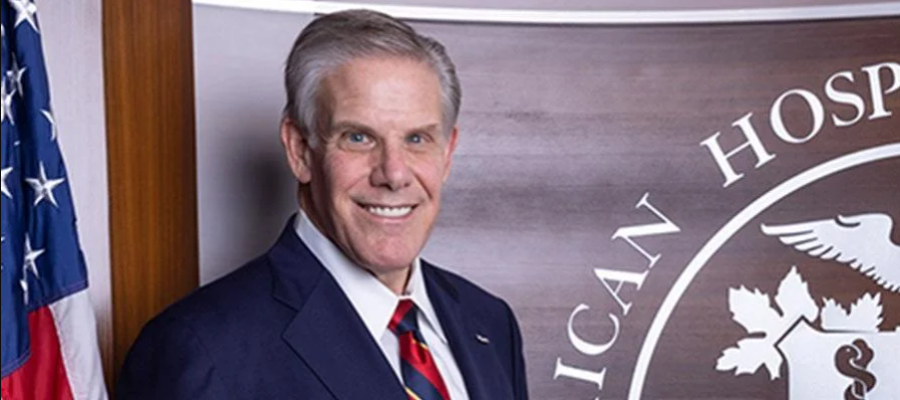Uniting to Protect Access to Care for Patients and Communities

After a week’s delay to try to build consensus among Republicans — due in large part to concerns we have been raising about Medicaid cuts — the House Energy & Commerce Committee could begin next week drafting its portion of the budget reconciliation bill as part of President Trump’s agenda to advance tax cuts that disproportionately benefit high income individuals. The committee is charged with finding $880 billion in savings, which could result in significant funding reductions and policy changes to the Medicaid program, although no specific details of what will be included as part of the markup have been released yet.
If there is one simple message that legislators need to hear loud and clear right now, it is “No harmful cuts to the Medicaid program.”
Medicaid covers 72 million Americans, and we need to tell legislators that cuts of the magnitude some are talking about could cause some hospitals to close and many others to reduce services. We need to tell them that Medicaid is a lifeline for rural hospitals. And we need to make sure they see the “faces of Medicaid:” children and babies; people with disabilities; the elderly and nursing home patients. It is a program that so many hard-working, low-income folks depend on…whether they are farmers, ranchers, veterans or single moms.
Now, the politicians will say they are not going to cut Medicaid or Medicare “benefits.” But that’s often code for saying that payment for providing the services is not off the table. We need to tell them that there will be no “benefits” available if we are unable to keep our doors open to deliver care.
And, they need to understand that cuts to Medicaid and Medicare don’t affect just these beneficiaries, but they affect everyone.
Moreover, because of crippling Medicaid underpayment, many states have developed supplemental payment programs to patch this fundamentally broken program. Some politicians call these strategies “waste, fraud and abuse.” They are nothing of the sort.
Legislators need to understand that these are legitimate financing methods with federal limits overseen by the Centers for Medicare & Medicaid Services — and have been approved by both Democratic and Republican administrations — including the Trump administration.
Cutting off these financing mechanisms for a program that is the single largest source of health care coverage in the United States while hurting patients and their caregivers is simply not real reform, and it risks blowing holes through Medicaid, state government budgets and our health care safety net.
These were some of the messages shared this week as 1,100 hospital and health system leaders came to Washington for the AHA’s 2025 Annual Membership Meeting. During the meeting, we also discussed the need to reject so-called site-neutral payments; preserve the 340B program; extend the Enhanced Premium Tax Credits that enable millions of Americans to buy affordable private health insurance; provide relief from burdensome regulations; and strengthen and support the health care workforce.
Throughout the week, hospital leaders from across the country delivered these key messages to their representatives and senators, emphasizing with powerful personal stories and examples how Medicaid cuts would jeopardize access to care for their patients and communities.
Prior to the Annual Meeting, we released an Action Alert with several new advocacy resources, including fact sheets and infographics, a digital toolkit containing a Medicaid Made Simple video, social media messages and more. We also shared a sample message that individuals can personalize and send to their lawmakers to urge them to reject funding cuts to Medicaid and other health care programs.
At the same time, the AHA continues to reinforce these messages in many ways with legislators, policymakers and other influential stakeholders. This week, we launched new digital advertisements in key Washington, D.C., publications and other targeted placements urging Congress to protect Medicaid. In addition, the Coalition to Strengthen America’s Healthcare, of which the AHA is a founding member, continues to run digital and televised national ads, as well as engage its 2.6 million advocates in grassroots advocacy campaigns.
There’s still a long way to go in the reconciliation process, which means we have more opportunities to tell our stories about the real impact harmful changes in Medicaid or other programs would have on patients’ access to care.
And as the process moves forward, AHA Board Chair Tina Freese Decker reminded hospital and health systems leaders in Washington this week that field unity is paramount as we remain focused on our fundamental mission. “We all may be different, [but] whether we are small or large, urban or rural, blue state or red state … what really unites us is that we care for people.”
When we are united, when we show up with one voice, one message, one undeniable presence, we have power that no one can ignore. We have influence that no one can dismiss. And we have a force in every state and congressional district across America that no opponent, no obstacle and no well-funded opposition can match.

